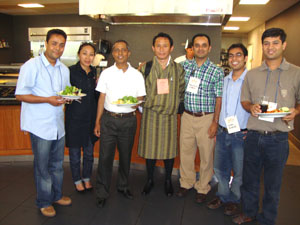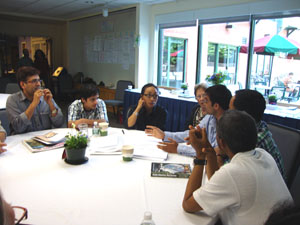GNH bounced back from US
June 5, 2010: A delegation of eight exiled Bhutanese has questioned the authenticity and usefulness of the Gross National Happiness in Bhutanese context.
The team comprised of Parangkush Subedi, Damber Timsina, Pashupati Timsina, Gopal Subedi, Madhav Acharya, Toya Acharya, Tika Acharya and Harka Khadka who joined the first GNH debates in US this June explained the organizers that the theory is a eyewash by Bhutan.
The conference was held between June 1 and 4 at Champlain College, Burlington, Vermont. Some o the important issues this delegation presented before the plenary for discussion include explanation on Bhutanese draconian policies, suppression on rights and liberty and failure to resolve the long standing refugee issue.
The delegation said that over 84000 Bhutanese of Nepali ethnicity were compelled to leave the country in the early 1990’s aftermath of peaceful demonstration in southern Bhutan demanding restoration of religious and cultural rights. This constituted about 17 percent of the total population in Bhutan.
Three major political parties are operating from exile: Bhutan National Democratic Party (BNDP), Druk National Congress (DNC) and Bhutan People’s Party (BPP). In addition there are two human rights organizations: Human Rights Organization of Bhutan (HUROB) and People’s Forum for Human Rights in Bhutan (PFHRB). They had been at the forefront of campaign for human rights and democracy in Bhutan.
Bhutan has decided to democratize the polity. A two-party democratic system is being practiced. The country’s per capita income has increased by almost five fold over the last two decades recording one of the highest in South Asia. The country considers gross national happiness of people more important than gross national income. With all said and done the trajectory path of socio-economic development sounds acceptable to all sections of Bhutanese society.
Bhutan’s relation with its neighbors has been improving. India and Bhutan enjoy unprecedented goodwill and the effort to tap large hydro-power potential is going-on bilateral basis. Bhutan has signed a treaty of friendship with the People’s Republic of China and time will come soon when Bhutan and China will establish residential embassies to foster economic cooperation. Bhutan is emerging out from the exclusive sphere of Indian influence. The United States of America is keen to promote closer relationship with Bhutan. Bhutan’s relationship with Nepal has been pushed to backburner because of the Bhutanese refugee imbroglio.
The international community has taken a bold decision to undertake rehabilitation of Bhutanese refugees in third countries. Of the total of 110,000 Bhutanese refugees about 30000 have already left the camps. By the end of this year some 50,000 refugees will be resettled in overseas countries. Overwhelming majority of the refugees has applied for third country resettlement options. USA is the destination to most of the Bhutanese refugees. The number of resettled Bhutanese refugees is likely to cross 60,000.
By 2013 Bhutan will have fresh election in the parliament. By then most of the refugees willing to resettle in overseas countries will have left the camps. Bhutan must aim for lock-stock-and-barrel solution to the refugee problem. No residual dissident activities should remain outside the country if we have to keep the country safe from unprecedented political movement.
The delegation proposed the following for resolution of this protracted refugee/political problem:
– Bhutan must permit the willing Bhutanese in exile to return to Bhutan with honor and dignity, including restitution of their properties.
– Bhutan must accord non-resident Bhutanese (NRB) status to the resettled refugees. This will in fact enhance the international profile of the country and justify establishment of residential embassies of refugee receiving countries in Thimphu. It is important for a country like Bhutan which is sandwiched between the two competing Asian giants: India and China. This will also encourage investments inside Bhutan from Bhutanese living abroad for the overall socio-economic development of the country.
– Bhutan must permit the political parties formed in exile to participate in the forth coming election of 2013 and permit the human rights organizations formed in exile to operate from inside the country.
– Promote inclusive democracy and release all the political prisoners in Bhutan. There are some 200 political prisoners in the country at present.
This is a unique opportunity for Bhutan to solve the protracted political and refugee problem. The solution not only will enhance the international image of Bhutan but will pre-empt any untoward political upheaval in the country from the residual political force operating from outside the country.
The concept of Gross National Happiness floated by Bhutan is a mere eye-wash to the International community if it fails to address the Bhutanese refugee issue and other concerns as just discussed.
It will be a lost opportunity if the government of Bhutan and the dissident organizations outside the country failed to seize this movement. There is a need to forget about the past grievances and come over the table for National Reconciliation.
Local newspapers (Seven Days) and TV channels (Channel 17) published/telecast the discussion with exiled Bhutanese with interests.
Karma Tshiteem, secretary of Bhutan’s Gross National Happiness Commission and the only speaker from inside Bhutan failed to answer the questions raised by Bhutanese in exile regarding the mass exodus in early 1990. He simply skipped the issue saying it was not the appropriate forum.
A separate plenary focused on Bhutan’s happiness theory and refugees. Entitled ‘GNH, Bhutanese refugees and National Reconciliation’, the plenary was attended by a group of people including Tshering Tashi, co-author with Tim Fischer of the book ‘From Jesuits to Jetsetters, BOLD BHUTAN BECKONS, Inhaling Gross National Happiness’ and Sonam Ongmo.
Linda Wheatley, the president the GNH USA project in an interview with local paper had said that she doesn’t condone actions by the Bhutanese government that might have led to the exodus of residents. She distinguishes between the effort to develop new indicators and events in Bhutan. “Bhutan is not perfect,” she said.


